Sir John Monash, Personal Files Book 2, 23 February - 31 March 1915, Part 4
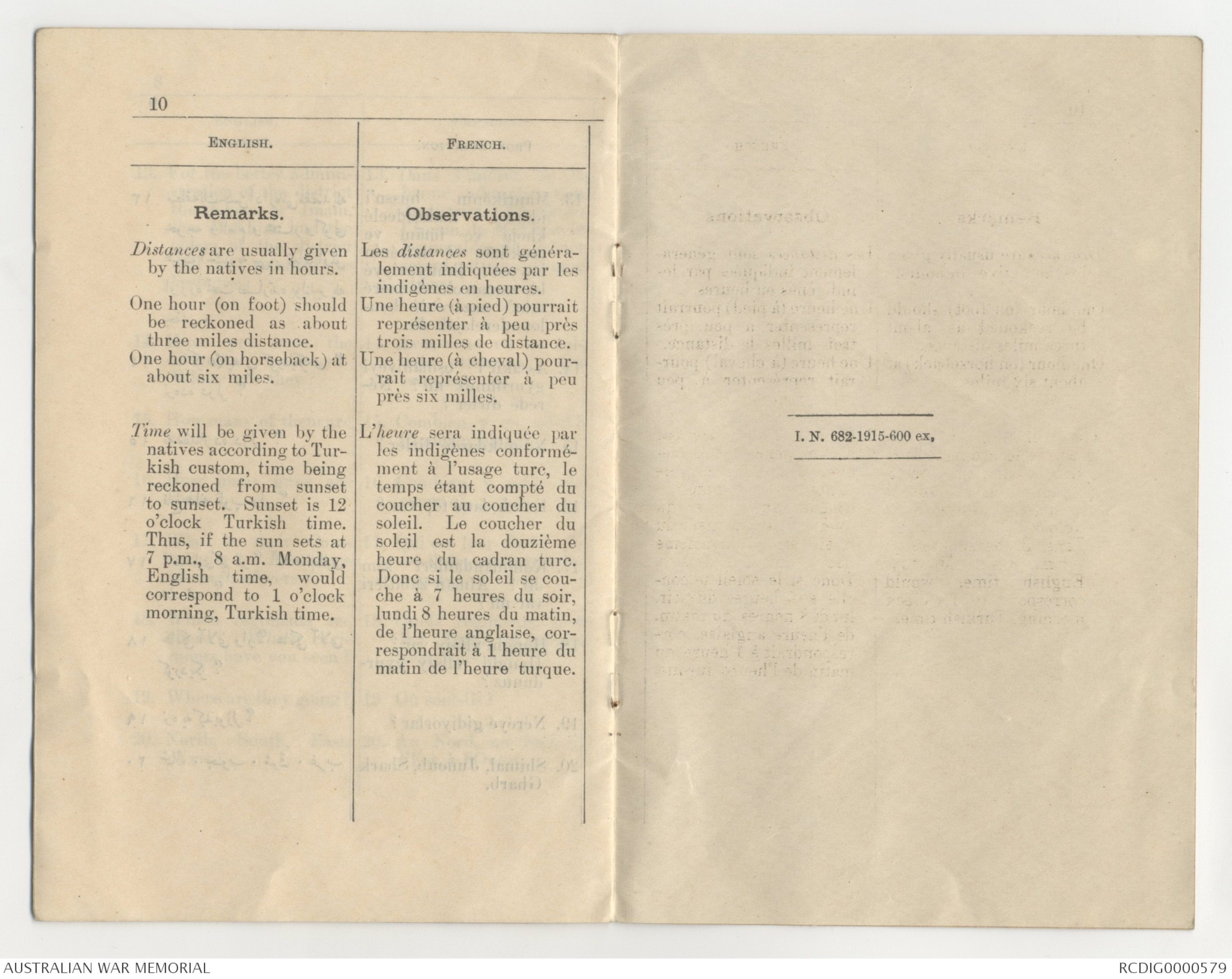
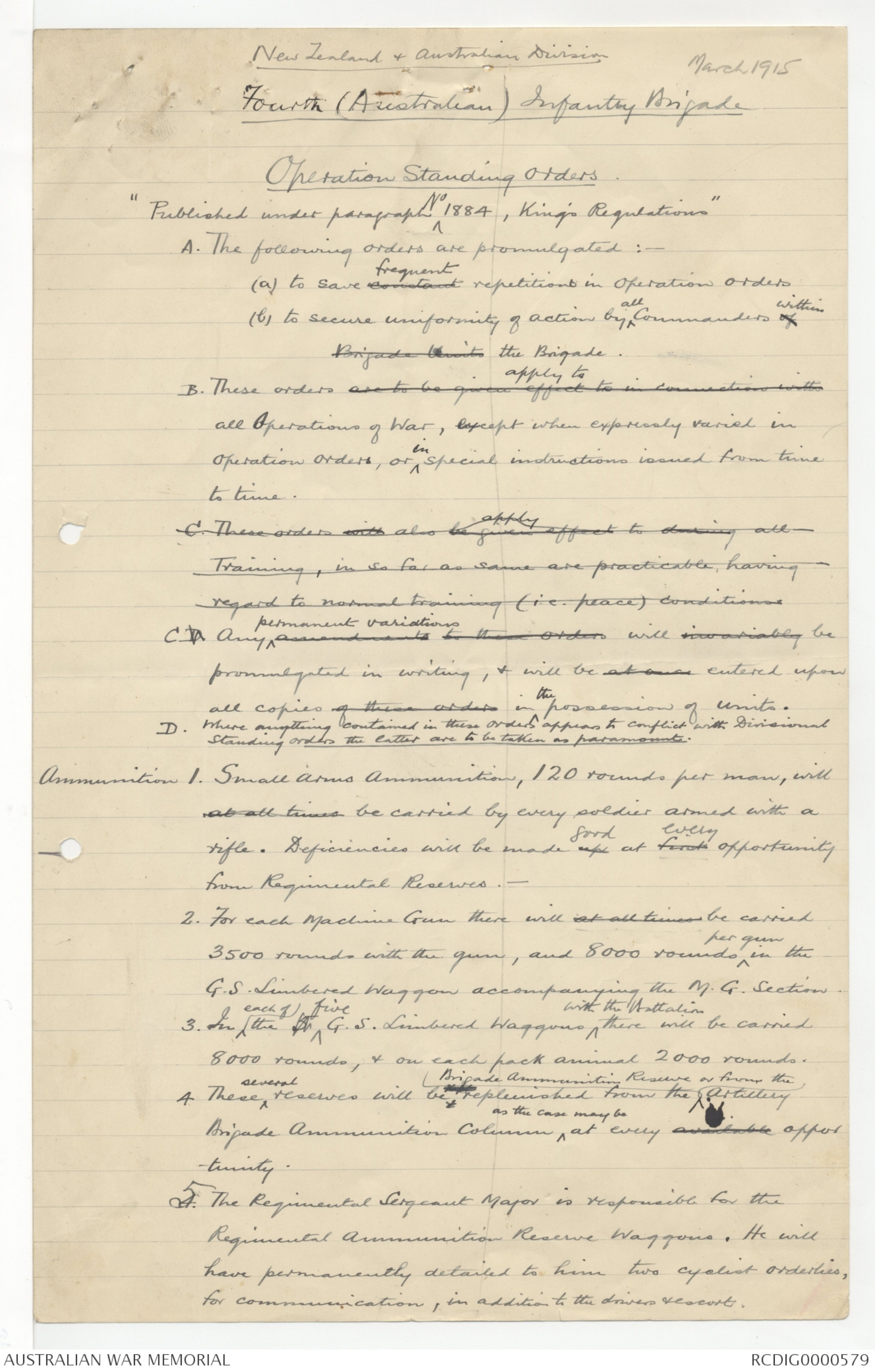
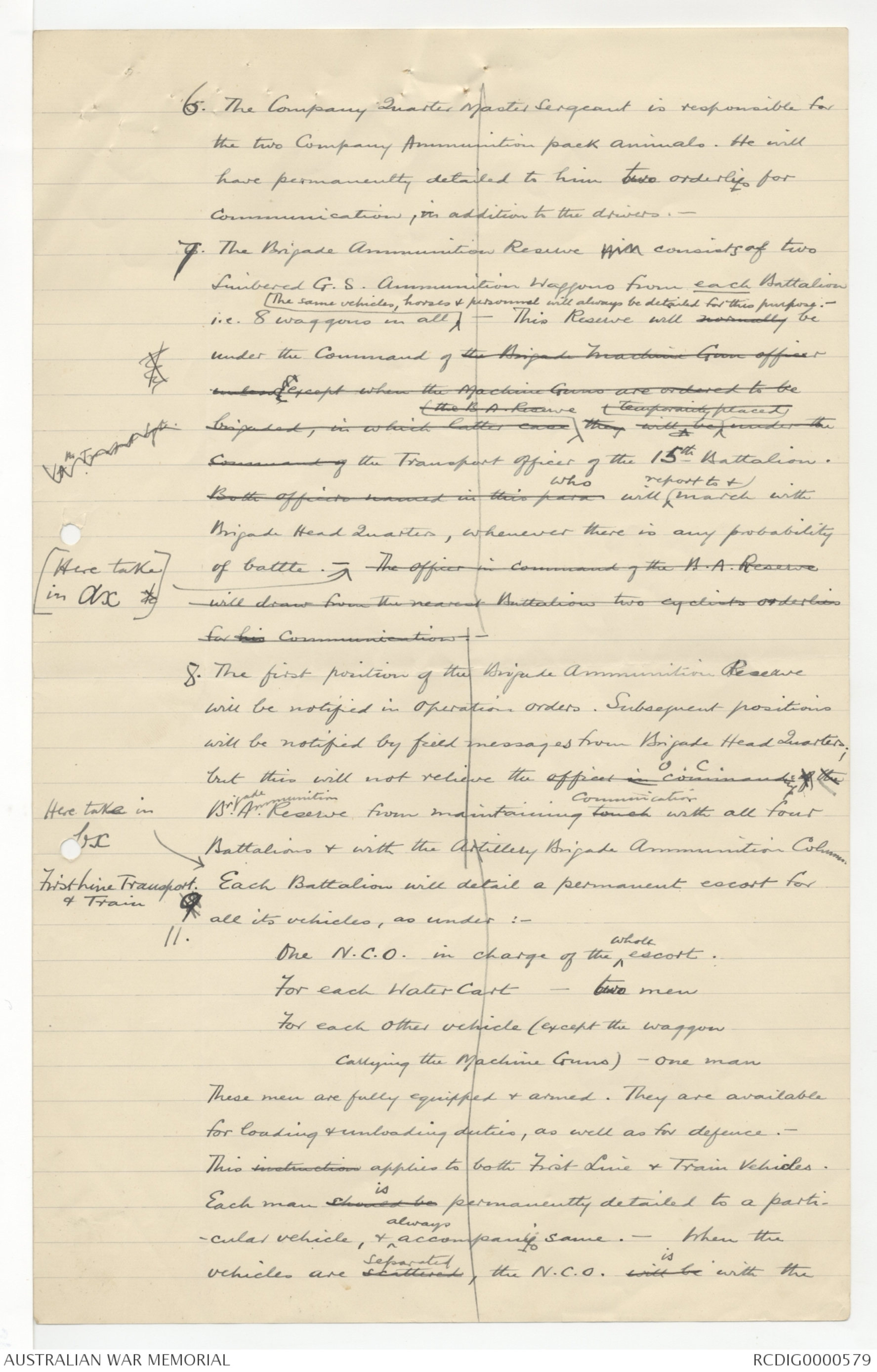
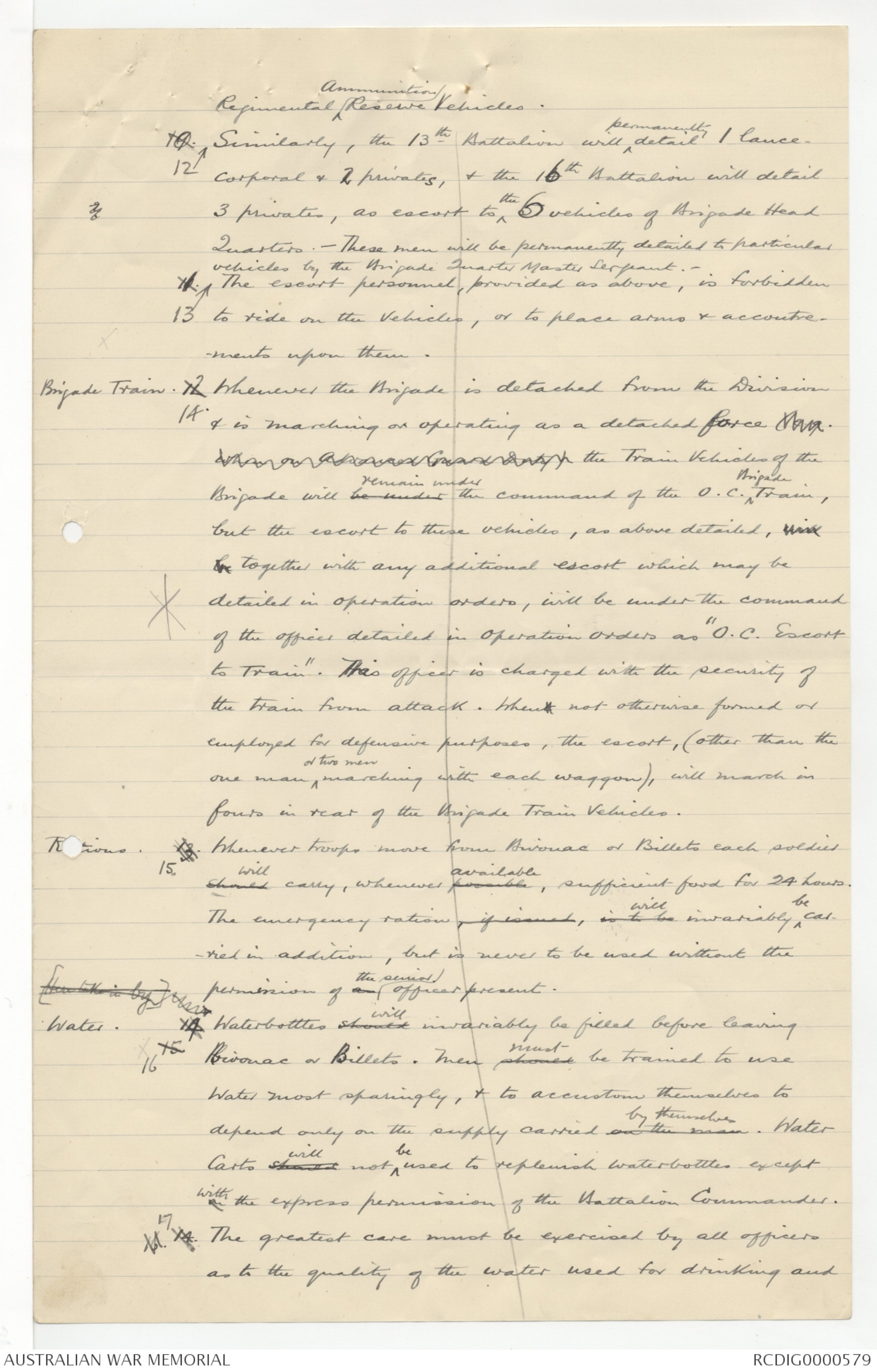
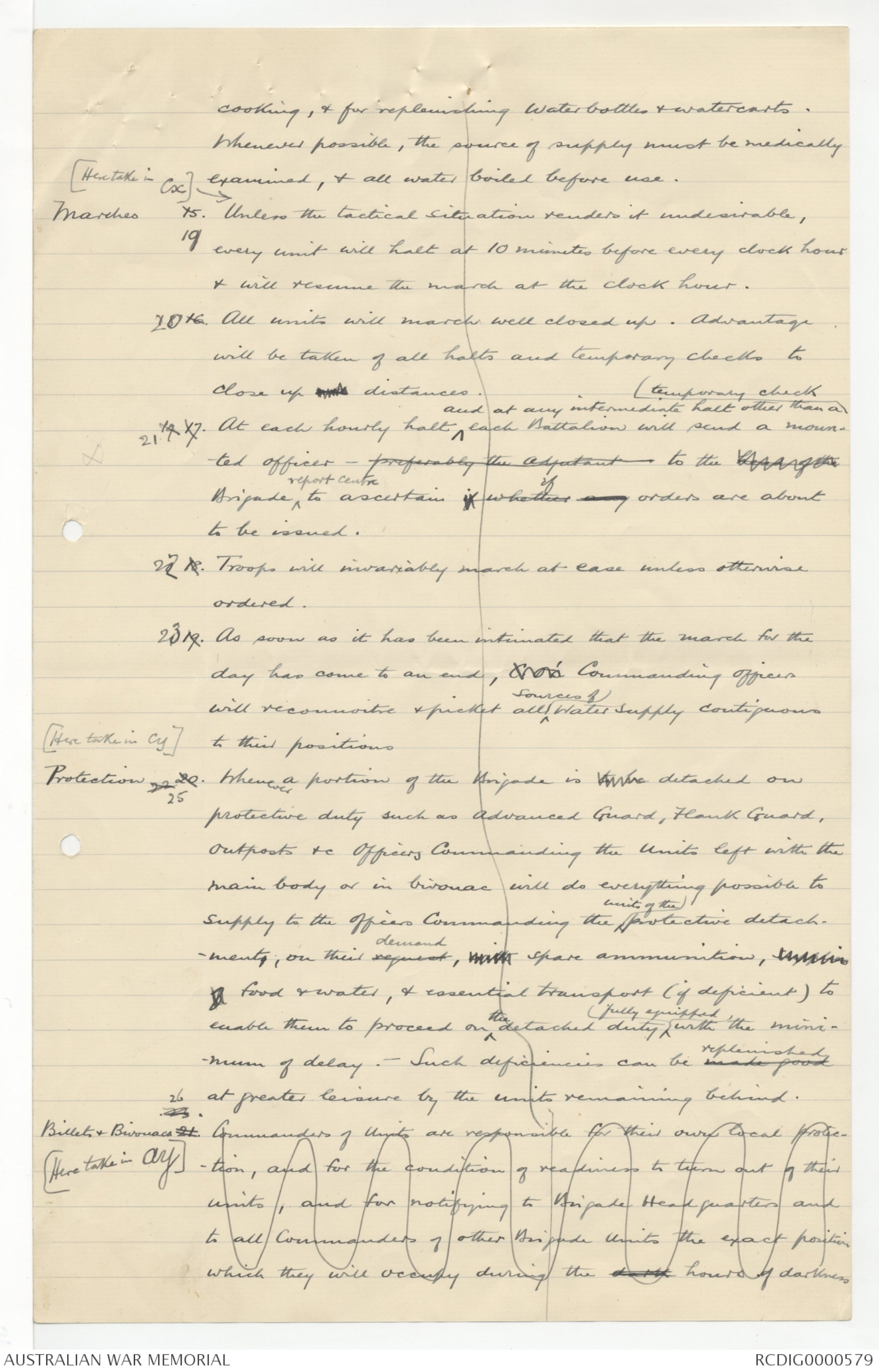
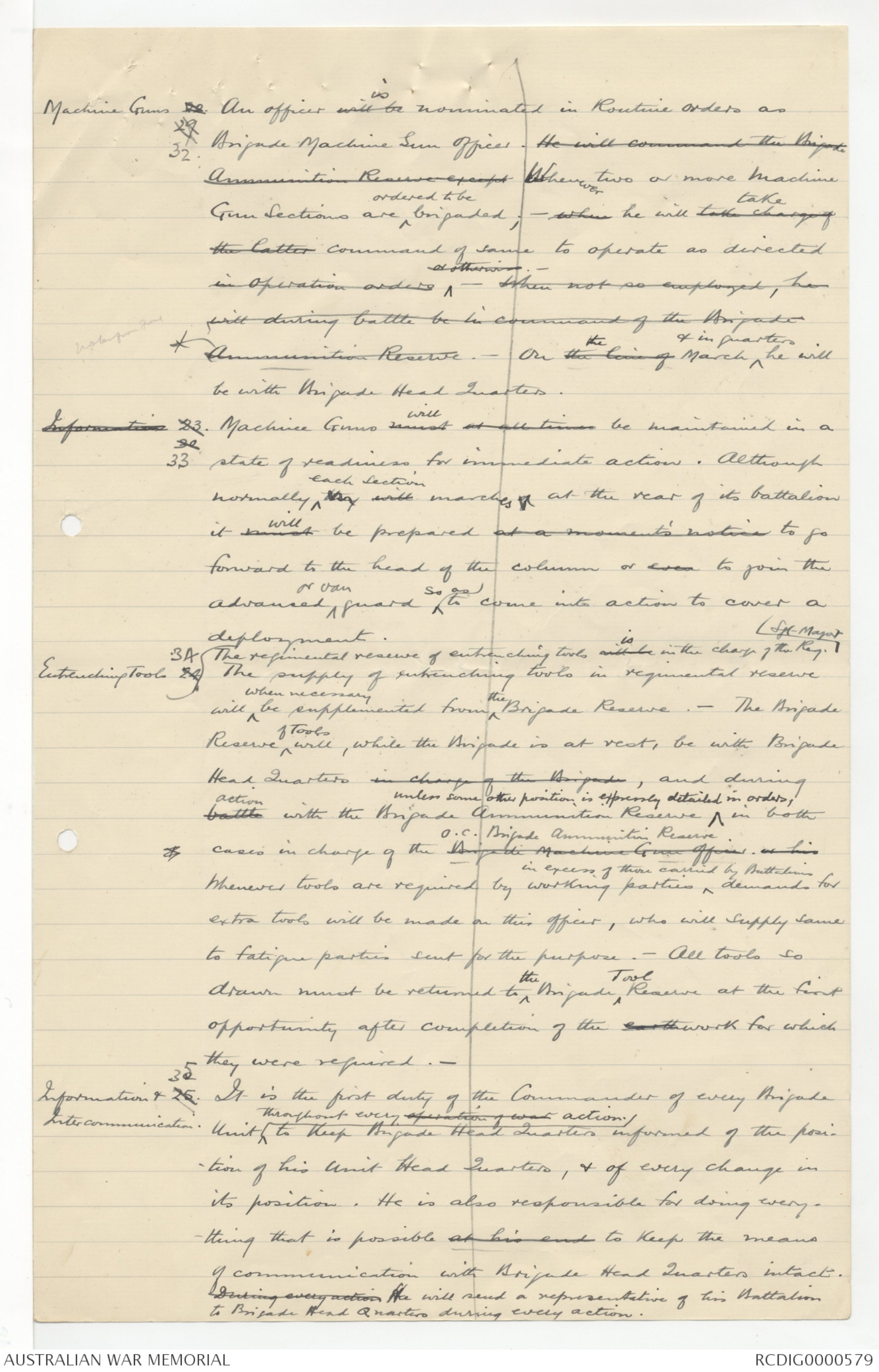
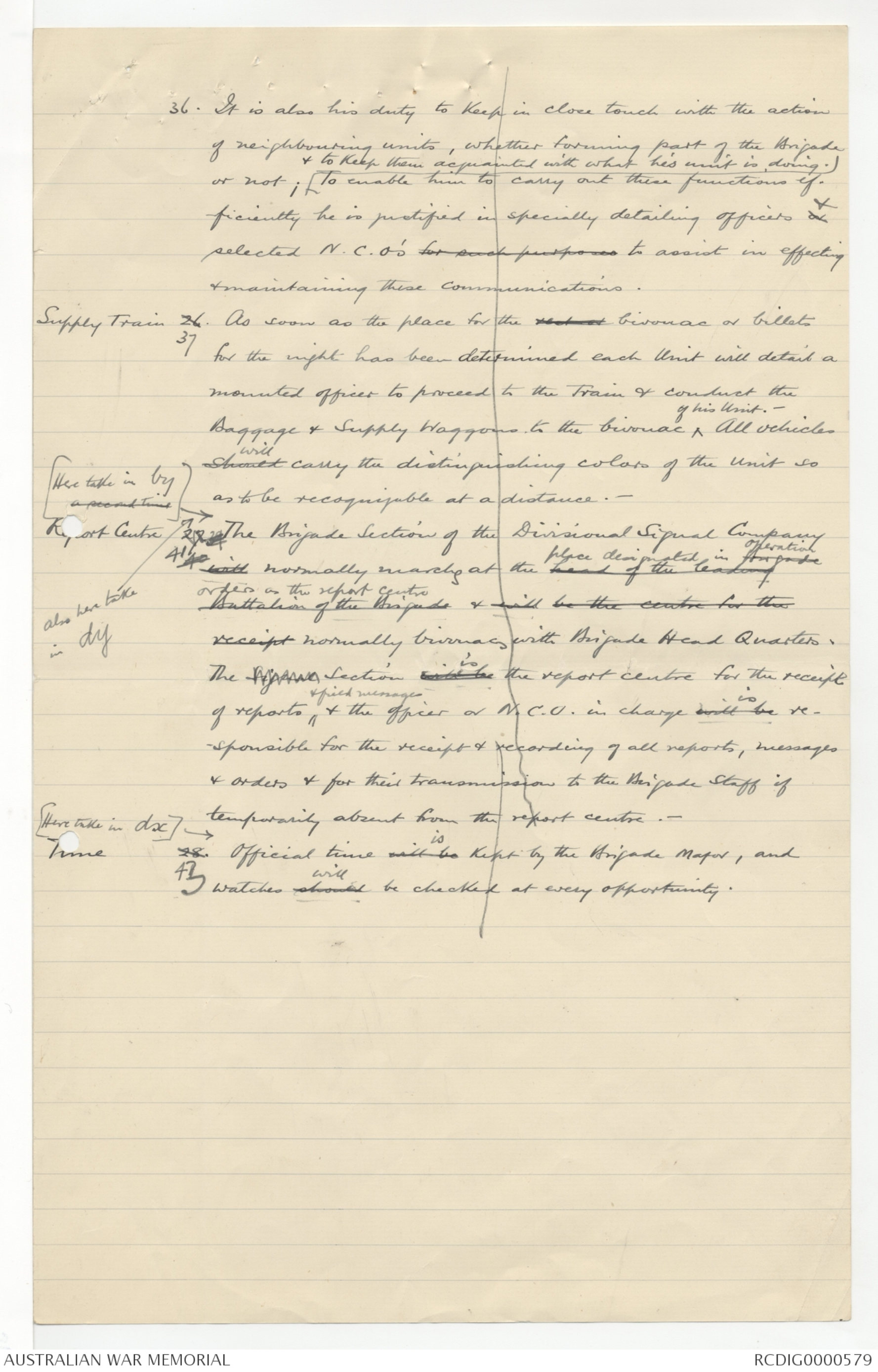
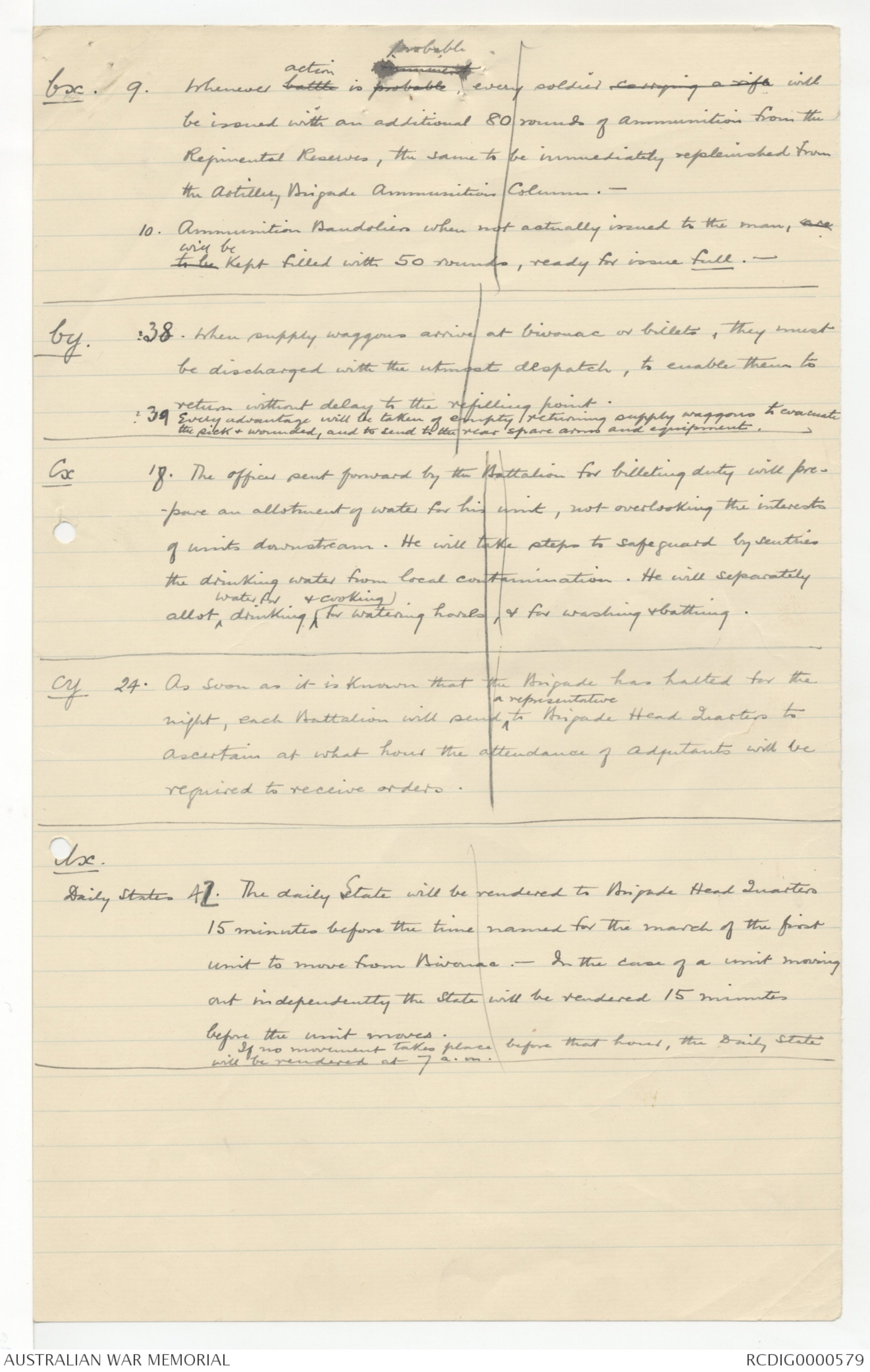
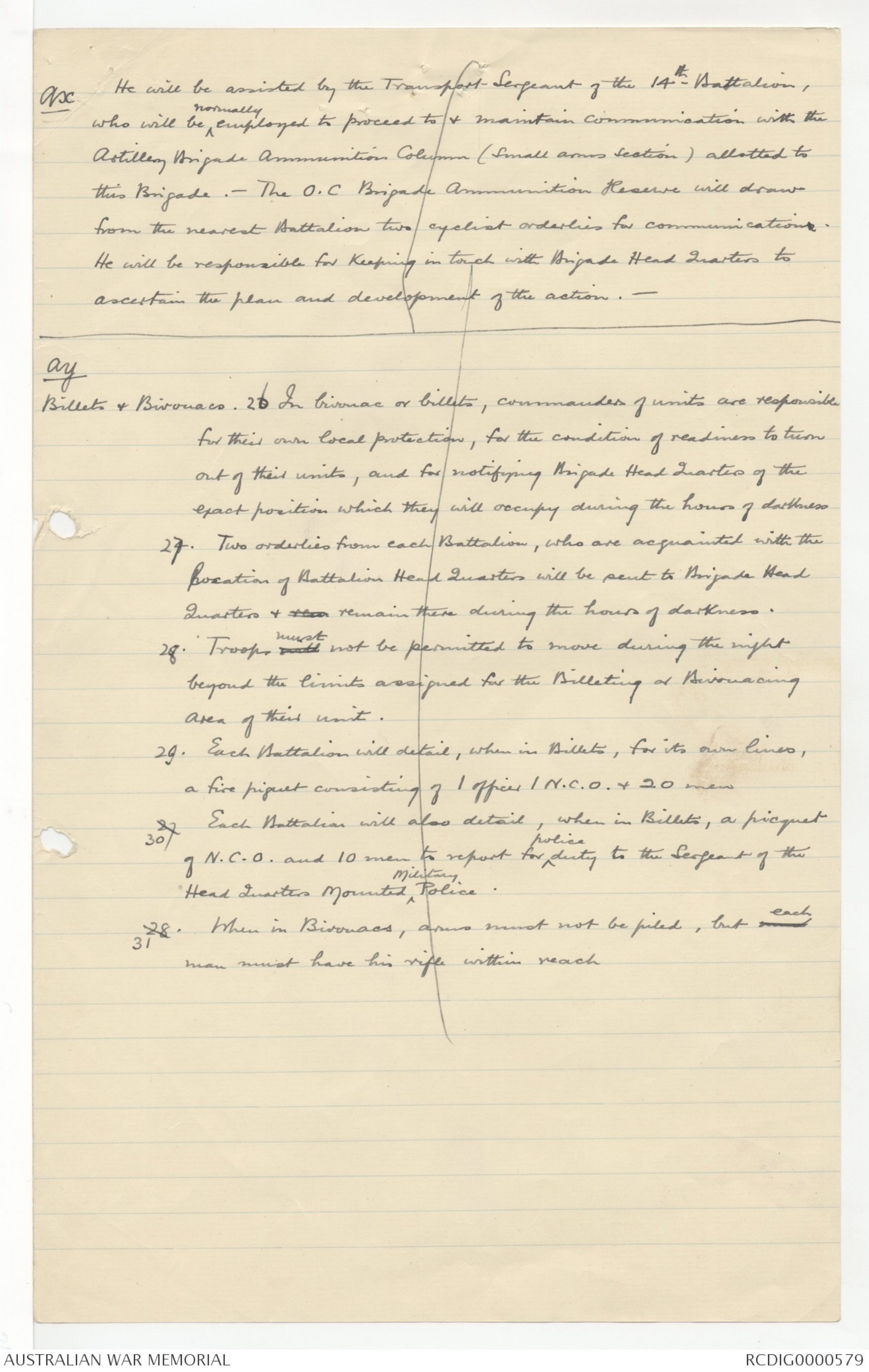
10
| ENGLISH | FRENCH |
| Remarks. | Observations. |
| Distances are usually given by the natives in hours. |
Les distances sont généralement indiquées par les indigènes en heures. |
| One hour (on foot) should be reckoned as about three miles distance. |
Une heure (à pied) pourrait représenter à peu près trois milles de distance. |
| One hour (on horseback) at about six miles. |
Une heure (à cheval) pourrait représenter à peu près six milles. |
| Time will be given by the natives according to Turkish custom, time being reckoned from sunset to sunset. Sunset is 12 o’clock Turkish time. Thus, if the sun sets at 7 p.m., 8 a.m. Monday, English time, would correspond to 1 o ‘clock morning, Turkish time. |
L’heure sera indiquée par les indigènes conformément à l’usage turc, le temps étant compté du coucher au coucher du soleil. Le coucher du soleil est la douzieme heure du cadran turc. Donc si le soleil se couche à 7 heures du soir, lundi 8 heures du matin, de l’heure anglaise, correspondrait à l’ heure du matin de l’heure turque. |
I. N. 682-1915-600 ex,
New Zealand & Australian Division
March 1915
Fourth (Australian) Infantry Brigade
Operation Standing Orders
"Published under paragraph No 1884, King's Regulations"
A. The following orders are promulgated: —
(a) to save constant frequent repetitions in Operation Orders
(b) to secure uniformity of action by all Commanders of withinBrigade Units the Brigade.
B. These orders are to be given apply to effect to in connection with
all Operations of War, except when expressly varied in
Operation Orders, orin special instructions issued from time
to time. C. These orders will also be applygiven effect to during allTraining, in so far as same are practicable, havingregard to normal training (i.e. peace) conditions
C D. Any permanent variations amendments to these orders will invariably be
promulgated in writing, & will be at once entered upon
all copies of these orders in thepossession of units.
D . Where anything contained in these orders appears to conflict with Divisional
Standing orders the latter are to be taken as paramount.
Ammunition 1. Small Arms Ammunition, 120 rounds per man, will
at all times be carried by every soldier armed with a
rifle . Deficiencies will be made up good at first every opportunity
from Regimental Reserves. —
2. For each Machine Gun there will at all times be carried
3500 rounds with the gun, and 8000 rounds per gun in the
G .S . Limbered Waggon accompanying the M.G. Section.
3. In each of the Bn five G.S. Limbered Waggons with the Battalion there will be carried
8000 rounds, & on each pack animal 2000 rounds.
4. These severalreserves will be xxxreplenished from the Brigade Ammunition Reserve or from theArtillery
Brigade Ammunition Column as the case may be at every available opportunity.
5. The Regimental Sergeant Major is responsible for the
Regimental Ammunition Reserve Waggons. He will
have permanently detailed to him two cyclist orderlies,
for communication, in addition to the drivers & escort.
6. The Company Quarter Master Sergeant is responsible for
the two Company Ammunition pack animals. He will
have permanently detailed to him two orderly's for
communications, in addition to the drivers. –
7. The Brigade Ammunition Reserve will consists of two
Limbered G .S . Ammunition Waggons from each Battalion
i.e. 8 waggons in all – The same vehicles, horses & personnel will always be detailed for this purpose. –This Reserve will normally be
{*X*} under the Command of the Brigade Machine Gun officerxxxxx (except when the Machine Guns are ordered to be
{*[14th Transport Bgde?]*} brigaded, in which latter case the B.A. Reservethey will be temporarily placedunder theCommand of the Transport Officer of the 15th Battalion.Both officers named in this para who will report to &march with
Brigade Head Quarters, whenever there is any probability
{*Here take in AX [tc?]*} of battle. – The officer in Command of the B.A Reservewill draw from the nearest Battalion two cyclists orderliesfor his Communications . –
8. The first position of the Brigade Ammunition Reserve
will be notified in Operation orders. Subsequent positions
will be notified by field messages from Brigade Head Quarters;
but this will not relieve the Officer in Command O.C. of the
Brigade Ammunition Reserve from maintaining touch communication with all four
Battalions & with the Artillery Brigade Ammunition Columns.
[*Here take in bx*}
{*First Line Transport. & Train*}
Each Battalion will detail a permanent escort for9 all its vehicles, as under: –
11 . One N.C.O. in charge of the wholeescort.
For each Water Cart – two men
For each other vehicle (except the waggon
carrying the Machine Guns) – one man
These men are fully equipped & armed. They are available
for loading &unloading duties, as well as for defence. –
This instruction applies to both First Line & Train Vehicles.
Each man should beis permanently detailed to a particular
vehicle, & always accompanies same. – When the
vehicles are scattered separated , the N.C.O. will be is with the
Regimental Ammunition Reserve Vehicles. 10. 12 Similarly, the 13th Battalion willpermanently detail 1 lance-
corporal & 2 privates, & the 16th Battalion will detail
3 privates, as escort tothe6 vehicles of Brigade Head
Quarters. – These men will be permanently detailed to particular
vehicles by the Brigade Quarter Master Sergeant. –11. 13 The escort personnel, provided as above, is forbidden
to ride on the Vehicles, or to place arms & accoutrements
upon them.
Brigade Train. 12 14 Whenever the Brigade is detached from the Division
& is marching or operating as a detached force xxxxwhen on Advanced Guard Duty the Train Vehicles of the
Brigade will be under remain under the command of the O . C . Brigade Train,
but the escort to these vehicles, as above detailed, willbe together with any additional escort which may be
detailed in operation orders, will be under the command
of the officer detailed in Operation Orders as "O. C. Escort
to Train". This officer is charged with the security of
the train from attack. Whent not otherwise formed or
employed for defensive purposes, the escort, (other than the
one man or two men marching with each waggon), will march in
fours in rear of the Brigade Train Vehicles.
Rations. 13. 15. Whenever troops move from Bivouac or Billets each soldiershould will carry, whenever possible available, sufficient food for 24 hours.
The emergency ration if issued , is to be will invariably be carried
in addition, but is never to be used without the
{*Here take in by*} permission of an ^the senior officer present.
Water. 14 15 16 Waterbottles should willinvariably be filled before leaving
Bivouac or Billets. Men should must be trained to use
Water most sparingly, & to accustom themselves to
depend only on the supply carried on the man by themselves . Water
Carts should willnot be used to replenish waterbottles excepton with the express permission of the Battalion Commander.16. 14. 17 The greatest care must be exercised by all officers
as to the quality of the water used for drinking and
cooking, & for replenishing Waterbottles & watercarts.
Whenever possible, the source of supply must be medically
examined, & all water boiled before use.
{*[Here take in Cx]*}
Marches 15. 19 Unless the tactical situation renders it undesirable,
every unit will halt at 10 minutes before every clock hour
& will resume the march at the clock hour.
20 16. All units will march well closed up. Advantage
will be taken of all halts and temporary checks to
close up xxx distances.
21 19 17. At each hourly halt and any intermediate halt other than a temporary check each battalion will send a
mounted officer - preferably the adjutant to the back of the
Brigadereport centre to ascertain if whether if any orders are about
to be issued.
22 18. Troops will invariably march at ease unless otherwise
ordered.
23 19. As soon as it has been intimated that the march for the
day has come to an end, C.O.'s Commanding Officers
will reconnoitre & picket all sources of water supply contiguous
to their positions
{*[Here take in Cy]*}
Protection 22 20 25. Wherever a portion of the Brigade is to be detached on
protective duty such as Advanced Guard, Flank Guard,
outposts &c Officers Commanding the Units left with the
main body or in bivouac will do everything possible to
supply to the Officers Commanding the units of the protective detachments ,
on their request demand, all spare ammunition, suppliesof food & water, & essential transport (if deficient) to
enable them to proceed on the detached duty fully equipped with the
minimum of delay. – Such deficiencies can be made good replenished
at greater leisure by the units remaining behind.
{*[Here take in Ay]*}
Billets & Bivouacs 21 23 26. Commanders of Units are responsible for their own local protection ,and for the condition of readiness to turn out of theirunits, and for notifying to Brigade Headquarters andto all Commanders of other Brigade Units the exact positionwhich they will occupy during the dark hours of darkness
Machine Guns 22 29 32. An officer will be is nominated in Routine orders as
Brigade Machine Gun Officer. He will command the BrigadeAmmunition Reserve except Whenever two or more Machine
Gun Sections are ordered to be brigaded: – when he will take charge of the latter take command of same to operate as directedin operation orders or otherwise - When not so employed , hewill during battle be in command of the Brigade* Ammunition Reserve. – On the the line of March & in quarters he will
be with Brigade Head Quarters.
Information 23 30 33. Machine guns must at all times will be maintained in a
state of readiness for immediate action. Although
normallyeach section they will marches on at the rear of its battalion
it must will be prepared at a moment's notice to go
forward to the head of the column or even to join the
advanced or vanguard so as to come into action to cover a
deployment.
Entrenching Tools 24 34 The regimental reserve of entrenching tools will be is in the charge of the Reg. Sgt. Major
The supply of entrenching tools in regimental reserve
will when necessary be supplemented from theBrigade Reserve. – The Brigade
Reserve of Tools will, while the Brigade is at rest, be with Brigade
Head Quarters in charge of the Brigade, and duringbattle action with the Brigade Ammunition Reserve unless some other position is expressly detailed in orders, in both
cases in charge of the Brigade Machine Gun Officer O. C. Brigade Ammunition Reserve. or his
Whenever tools are required by working parties in excess of those carried by Battalions demands for
extra tools will be made on their officer, who will supply same
to fatigue parties sent for the purpose. – All tools so
drawn must be returned to the Brigade Tool Reserve at the first
opportunity after completion of the earth work for which
they were required. –
Information & Intercommunication. 25 35 It is the first duty of the Commander of every Brigade
Unitthroughout every operation of war action. – . to keep Brigade Head Quarters informed of the
position of his Unit Head Quarters, & of every change in
its position. He is also responsible for doing everything
that is possible at his end to keep the means
of communication with Brigade Head Quarters intact.During every action He will send a representative of his Battalion
to Brigade Head Quarters during every action.
36. It is also his duty to Keep in close touch with the action
of neighbouring units, whether forming part of the Brigade
or not; & to Keep them acquainted with what his unit is doing. To enable him to carry out these functions
efficiently he is justified in specially detailing officers or &
selected N.C.O's for such purposes to assist in effecting
& maintaining these communications.
Supply Train 26. 37 As soon as the place for the xxxx or bivouac or billets
for the night has been determined each Unit will detail a
mounted officer to proceed to the Train & conduct the
Baggage & Supply Waggons to the bivouac of his Unit. – All vehiclesshouldwill carry the distinguishing colors of the Unit so
as to be recognizable at a distance. –
{*[Here take in by a second time] →*]}
Report Centre {*Also here take in dy*}↑ 27 29 40 41 The Brigade Section of Divisional Signal Companywill normally marching at the head of the leading place designated in an order operational Battalion of the Brigade orders as the report centre & will be the centre for the receipt normally bivouacs with Brigade Head Quarters.
The Signal Section will be is the report centre for the receipt
of reports & field messages & the officer or N.C.O. in charge will be is
responsible for the receipt & recording of all reports, messages
& orders & for their transmission to the Brigade staff if
temporarily absent from the report centre. –
{*[Here take in dx]*}
Time 28. 43 Official time well be is kept by the Brigade Major, and
watches should willbe checked at every opportunity.
bx . 9. Whenever battle action is probable imminent probable, every soldier carrying a rifle will
be issued with an additional 80 rounds of ammunition from the
Regimental Reserves, the same to be immediately replenished from
the Artillery Brigade Ammunition Column. –
10. Ammunition Bandoliers when not actually issued to the man, are to be will be kept filled with 50 rounds, ready for issue full. –
by . 38. When supply waggons arrive at bivouac or billets, they must
be discharged with the utmost despatch, to enable them to
return without delay to the refilling point.
39 Every advantage will be taken of empty returning supply waggons to evacuate
the sick & wounded, and to send to the rear spare arms and equipment.
Cx 18. The officer sent forward by the Battalion for billeting duty will prepare
an allotment of water for his unit, not overlooking the interests
of units downstream. He will take steps to safe guard by sentries
the drinking water from local contamination. He will separately
allotwater for drinking & cooking for watering horses, & for washing & bathing.
cy 24. As soon as it is Known that the Brigade has halted for the
night, each Battalion will send a representative to Brigade Head Quarters to
ascertain at what hour the attendance of adjutants will be
required to receive orders.
dx .
Daily States 42. The daily State will be rendered to Brigade Head Quarters
15 minutes before the time named for the march of the first
unit to move from Bivouac. – In the case of a unit moving
out independently the State will be rendered 15 minutes
before the unit moves.
If no movement takes place before that hour, the Daily State
will be rendered at 7 a.m.
Ax He will be assisted by the Transport Sergeant of the 14th Battalion,
who will be normally employed to proceed to & maintain communication with the
Artillery Brigade Ammunition Column (small arms section) allotted to
this Brigade. – The O.C. Brigade Ammunition Reserve will draw
from the nearest Battalion two cyclist orderlies for communications.
He will be responsible for keeping in touch with Brigade Head Quarters to
ascertain the plan and development of the action. –
Ay
Billets & Bivouacs. 26 In bivouac or billets, commanders of units are responsible
for their own local protection, for the condition of readiness to turn
out of their units, and for notifying Brigade Head Quarters of the
exact position which they will occupy during hours of darkness
27. Two orderlies from each Battalion, who are acquainted with the
location of Battalion Head Quarters will be sent to Brigade Head
Quarters & rem remain there during the hours of darkness.
28. Troops will must not be permitted to move during the night
beyond the limits assigned for the Billeting or Bivouacing
area of their unit.
29. Each Battalion will detail, when in Billets, for its own lines,
a fire piquet consisting of 1 officer 1 N.C.O. & 20 men 27 30 Each Battalion will also detail, when in Billets, a picquet
of N.C.O. and 10 men to report for police duty to the Sergeant of the
Head Quarters Mounted Military Police. 28 . 31 When in Bivouacs, arms must not be piled, but must each
man must have his rifle within reach
 Jacqueline Kennedy
Jacqueline KennedyThis transcription item is now locked to you for editing. To release the lock either Save your changes or Cancel.
This lock will be automatically released after 60 minutes of inactivity.